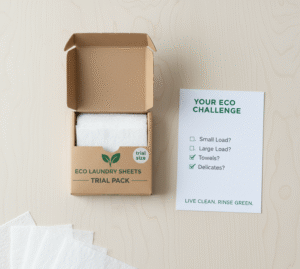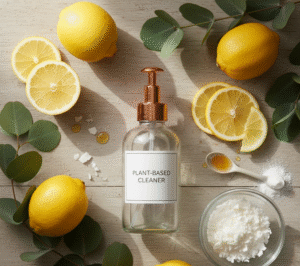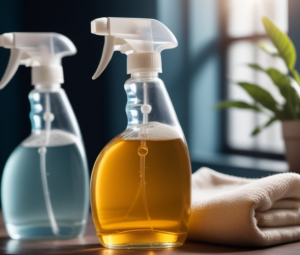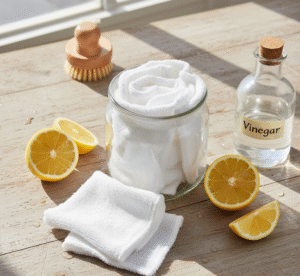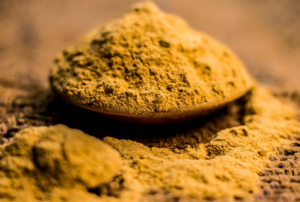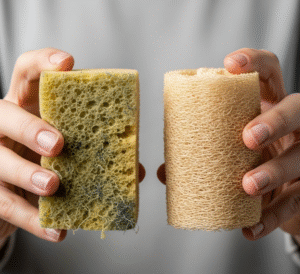The Dirty Truth About Everyday Degreasers
You scrub your stove, feel good about the shiny metal, and then-hours later-you smell that harsh chemical sting again. Because most degreasers don’t really disappear. They linger in pores, crevices, cracks. The kind of cleaner sold at bright-packaged aisles often hides active solvents, VOCs, surfactants, and “enhancers” that irritate skin, trigger asthma, eat at seals. Scientists have flagged common ingredients like 2-butoxyethanol for sensory irritation and more.
And here’s a cold truth: dumping harsh degreasers down the sink or into drains means those toxins don’t vanish either – they seep into soil, contaminate water tables, kill beneficial microbes. Environmental reviews have shown how deep this impact goes.
You probably didn’t ask for this mess when you just wanted a clean stove. But it’s exactly the reason a better option has to exist.

What Exactly Is a Natural Citrus Degreaser?
Imagine peeling an orange and squeezing the peel until a thin oil film floats on water. That oil is rich in d-limonene – nature’s solvent. That’s what powers the cut-through grease action. In many citrus degreasers, d-limonene is the primary agent, and it’s what makes them different from just “citrus-scented” sprays, according to industry studies.
Some labs even derive the citrus extract from orange peels (waste!) and combine it with foaming agents like betaine to get surprising grease removal, as noted in recent formulations research.

Are Chemical Degreasers Putting You at Risk Without You Realizing?
Let me ask: how often do you rinse your stove or grill just once after applying a degreaser? If residue remains, you ingest-or at least touch-the remnants. Over time, repeated exposure to solvents and residues may stress your liver, lungs, skin barrier.
Plus, many traditional degreasers emit VOCs – stuff that evaporates into the air you breathe. These compounds can irritate airways or worsen allergies. The more you open a window to “air it out,” the more you know you’ve got a problem.
Water systems also suffer. When degreasers enter rivers or soil, surfactants deplete oxygen, chemical byproducts accumulate, and ecosystems take a hit, according to environmental reports.
There’s a creeping danger: you believe your cleaning makes your home safer, but it might be exposing you in small doses. That’s not paranoia – it’s paying attention.
Why Citrus Works Better Than You Think
Okay, you’re here because the promise sounds too good: “natural citrus degreasers.” But they really deliver.
- Solvent power: d-limonene is a strong, natural solvent. It dissolves oils and grease nearly as well as petroleum solvents-sometimes more cleanly, as outlined by chemical specialists.
- Biodegradability: citrus compounds break down faster in the environment than many synthetic solvents, a point emphasized in sustainable manufacturing reviews.
- Dual use: citrus oils also carry mild antibacterial properties.
- Real-world wins: kitchens, mechanics, industrial settings are already shifting toward citrus-based cleaners.

The Unsung Benefits Beyond Degreasing
Here’s where citrus surprises you:
Kids and pets? Less harsh fumes means fewer sneezes and skin complaints. The smell? A fresh burst of orange or lemon instead of chemical burn. And when rinsed, citrus compounds degrade quicker, causing less buildup in waterways. Even businesses love it-switching to citrus is a statement of care, not just function.
How to Use Natural Citrus Degreasers Effectively
Want results? Don’t just spray and hope.
DIY route
Peel citrus (or save peels), cover with vinegar or alcohol, steep, strain, and add a nonionic surfactant. Studies have shown that orange peel extract paired with betaine works remarkably well for grease removal.
Buy smart
Check that the product lists “d-limonene” or “citrus terpenes” high in the ingredients. Avoid “citrus fragrance” which often hides synthetic solvents.
Technique
- Warm the greasy surface slightly before spraying.
- Spray, wait 30–60 seconds.
- Wipe or scrub clean.
- Rinse thoroughly.
Dilution
Many citrus degreasers come concentrated – dilute before use to avoid overkill or damaging surfaces.

Things You Should Watch Out For (Yes, Even With Natural Products)
Stop – don’t assume “natural = safe in all cases.”
Natural stone like marble and granite, and wax-finished wood, can etch or discolor under citrus acidity. Some people even develop allergies to citrus oils, as noted in cleaning industry discussions.
Also: “citrus-scented” doesn’t mean citrus-powered. Check the ingredients. And remember-citrus oils oxidize. Store tightly sealed, away from heat and light.
The Future of Cleaning Is Citrus-Based
I’m betting: sooner than you think, your local cleaning supplier will carry a whole citrus aisle. The push toward bio-based solvents is rising fast, driven by performance and sustainability, according to eco-manufacturing experts.
Industry, food processing, even auto sectors are switching away from chlorinated solvents. The reason? Performance + compliance + image.
Switch now and you’re simply ahead of the curve.
The Cleaner Choice Isn’t Just Cleaner – It’s Safer
Here’s the bottom line: natural citrus degreasers offer real degreasing power, but with a gentler footprint – for you, your family, your space, and your planet. You get to clean boldly and wisely.
So next time you reach for a degreaser, ask yourself: is it citrus-powered, or just polished marketing? Make the switch. Your nose, your skin, and your conscience will thank you.
